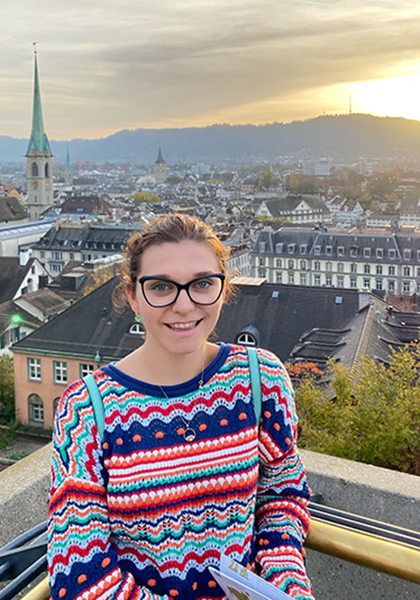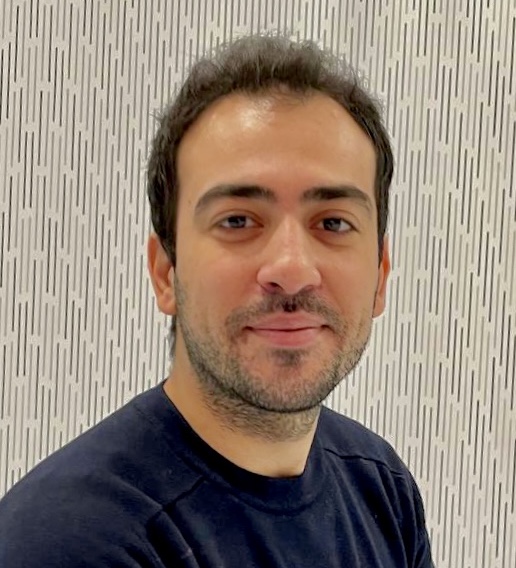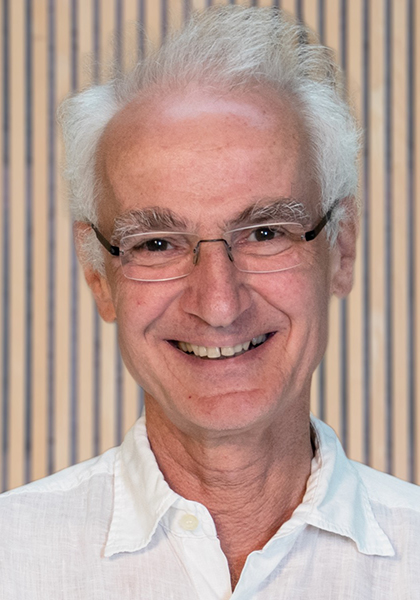Sprechen Sie Deutsch?

Last Monday, 215 Bachelor’s students and 452 Master’s students as well as 169 PhD candidates from abroad took up their studies at UZH. In addition, some 530 mobility students are joining UZH for one or two semesters.*
Studying at a foreign university brings many questions, of course. What’s it like to study at a Swiss university? Where can I make friends? What can I do to make Switzerland feel more like home? While getting to know a new university in a foreign city and culture is exciting, it can also be challenging, especially in the beginning. “For many students and PhD candidates from non-German-speaking countries, the German language courses at the Language Center of UZH and ETH Zurich are an excellent way to learn about their host country and meet new people,” says Ueli Bachmann, who heads up the German-as-a-foreign-language group at the Language Center.
Teaming up to succeed
In the center’s German courses, students not only learn one of Switzerland’s four national languages and gain an understanding of Swiss culture, but they also get to meet others who are in the same situation as them. This helps foster a sense of community, allowing language learners to bond over share experiences. Of course, the teachers also play a crucial role. “For students, their teacher represents the host country. The rapport that language learners develop with them throughout the course makes it easier for them to access the language and culture,” says Bachmann. Fifty percent of learning success depends on a good relationship between a student and their teacher, adds Bachmann, quoting famous education academic John Hattie.
Mistakes are par for the course
Kübra Stoican from Turkey uses the words “motivating” and “supportive” to describe her rapport with German teacher Michiko Farrér-Yamanaka. The Master’s student, whose home university is the Technical University of Munich, is on an exchange semester at ETH and attended an intensive German course before the start of the semester. “Thanks to Michiko’s teaching style, learning the language was a lot of fun,” says Kübra. “It’s the reason why about half of the group – myself included – registered for the continuation course during the semester.”
The sports science student enjoys learning about Swiss culture, in particular. Many of the things she learned in the course have helped her become immersed in the culture of Switzerland. The learning environment at the Language Center has encouraged her to strike up conversations with locals: “Communicating with others, even if we make mistakes – that’s the mindset in the course and it’s given me the confidence to do so,” she says.

Communicating with others, even if we make mistakes – that’s the mindset in the course and it’s given me the confidence to do so.
Challenge of making friends
One of the main reasons why international students want to learn German is because they want to be able to talk to people and make new acquaintances. “It’s important for me that I can talk to the locals in their language – it makes me feel more at home,” says Milad Ameri, a microbiologist and immunology PhD student.
The Iranian national has been living in Switzerland for several years. He completed his Master’s degree in neuroscience at the University of Geneva and then worked at Medicine Campus Davos. “I experience UZH as very open and friendly towards international students,” he says. But he admits it can be difficult for foreigners to meet Swiss students and PhD candidates. “There are very few events that feature small groups, or situations where you can really get to know other people,” says Milad. The Swiss friends he’s made along the way have all come from outside the university, for example people who live in the same building.

I experience UZH as very open and friendly towards international students.
Connection through language
Japanese Bachelor’s student Yuki Mizukami can relate. He has spent the last two semesters at UZH as a mobility student, taking philosophy and sociology classes. Thanks to the German courses at the Language Center, he quickly found new friends. “We also met in our free time to speak and practice German together,” Yuki says. But meeting Swiss students proved more difficult. This is where his interest in Swiss German came in handy. “Language helped me connect with others at university: Swiss students were very happy to explain things to me,” he says. “Once you know one or two people, it gets easier, because they then introduce you to their friends.”
TV, books, conversations
Besides his interest in the history of the “Verdingkinder” – child laborers – in Switzerland, Swiss German was the main reason why Yuki decided to spend a year in Switzerland. During a previous stay in Canada, he had met someone from the canton of Aargau and fell in love with the language. “What intrigues me is that there are no spelling rules for Swiss German,” says Yuki. To help him learn the language, he watches Swiss television programs, reads books and chats with friends. As does Milad. He especially appreciates it when his Swiss friends invite him to family events or dinners, as this provides him with authentic glimpses into Swiss culture. These are also the events where he is inevitably asked to pronounce that famous unwieldy Swiss German word, but this doesn’t faze him: “Saying ‘Chuchichäschtli’ is no problem for me. The Persian language has some fairly similar sounds,” he says, laughing.
Courses they are a-changing
According to Ueli Bachmann, the Language Center’s Swiss German courses are particularly popular among university employees, PhD candidates and professors who already speak German at a high level. The center’s courses are geared towards the needs of students, and they reflect the changing times. Twenty-nine years ago, when Bachmann started working as a German teacher at UZH and ETH, advanced German courses were most in demand. “Students from abroad already had to have some German skills to be able to matriculate,” he recalls. The German courses were needed to make sure they were fit to study.
Growing importance of English in academia
Today, German skills are no longer a must-have for foreign students who want to study at UZH or ETH. With the increasing internationalization of UZH and the introduction of the Erasmus program, UZH started offering courses in English for mobility students. The purpose of German courses has changed accordingly over the past 25 years, Bachmann explains. “Nowadays, learning German mainly helps students navigate social life at university.”
The internationalization of the university has had an immediate effect on the Language Center’s course offering. Unlike in the past, most German courses at the center are now aimed at beginners. And another trend has also become apparent: “We’re increasingly also taking on general and introductory tasks that go beyond language instruction. For example, we help incoming students to understand what it takes to study at a European university,” says Bachmann.

Nowadays, learning German mainly helps students navigate social life at university.
Number of foreign students on the rise
A look at the numbers confirms that UZH is becoming an increasingly popular destination for mobility students. Back in the 2005/2006 academic year, 148 foreign students came to UZH on an exchange program. Today, this figure has increased more than fivefold. With the exception of the pandemic year 2020/2021, the number of foreign mobility students has risen every year.
Incoming PhD candidate numbers were unaffected by the pandemic, with UZH seeing a steady rise in PhD hopefuls from abroad. At present, 2,372 foreign PhD students are matriculated at UZH – an increase of no less than 218% since the 2005/2006 academic year.
The number of Bachelor’s and Masters’ students from abroad who study at UZH is also on the rise. Since the Licentiate program was officially discontinued in 2015, the number of foreign Master’s students has almost doubled – from 1,127 in 2015 to 2,089 this year. Moreover, 1,802 foreign students are currently enrolled in Bachelor’s programs at UZH, which is 326 more than in 2015.
The budding academics’ countries of origin, however, haven’t changed much: the majority of students who come to UZH from abroad are from Europe, followed by Asia. Among the mobility students, Africa sends the fewest, and among the regular student body, Australia/Oceania are the least represented. The picture is similar among incoming PhD candidates, with Switzerland’s neighboring countries and China among the most common countries of origin.
More learning opportunities outside of uni
Given this diversity, it is clear why English is often the go-to language in academia. Milan thus also refers to German as his “leisure language”. “I only occasionally need my German skills at work, when I work in the clinic,” he says. His friendship and conversations with German native speakers are all the more important, as they enable him to consolidate his language skills. Ueli Bachmann has some advice for people who still lack the confidence to speak their new foreign language. He recommends that they take the course “Theatrale Improvisation”, or theater improv. On the course, students act out conflict situations in which they have to take action spontaneously.
The range of courses offered at the Language Center is impressive. The only things the two international students would like to see more of are more learning activities outside of university, for example in the city, and more insights into Swiss German. “After all, directly interacting with Swiss people offers the best learning opportunities,” says Milad.
*Please note that matriculations for the 2023 Fall Semester have not yet been finalized. All student numbers are as of 15 September 2023 and are still subject to change. The final figures will not be known until November.